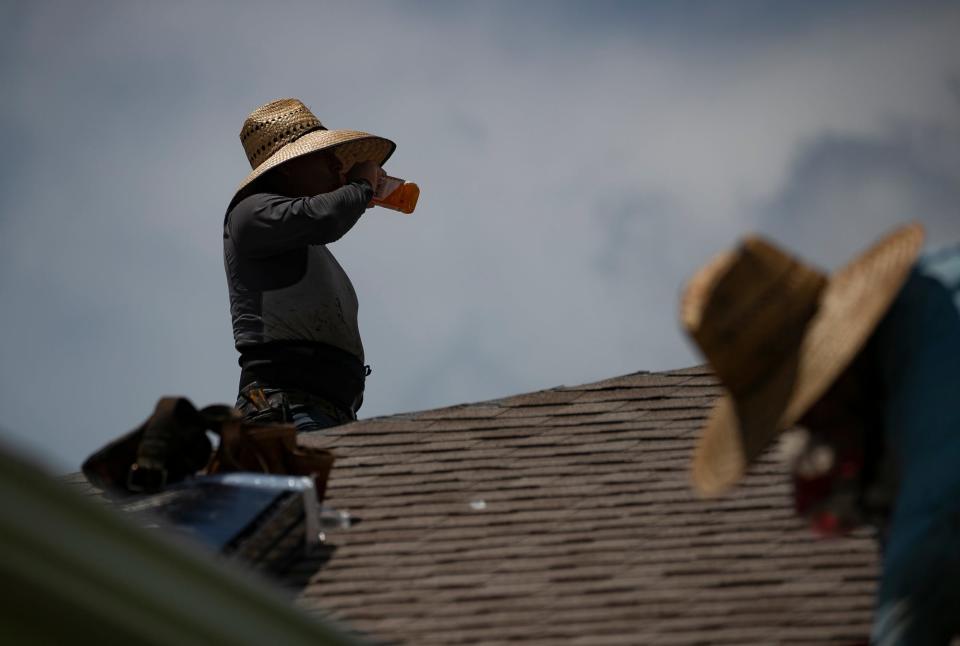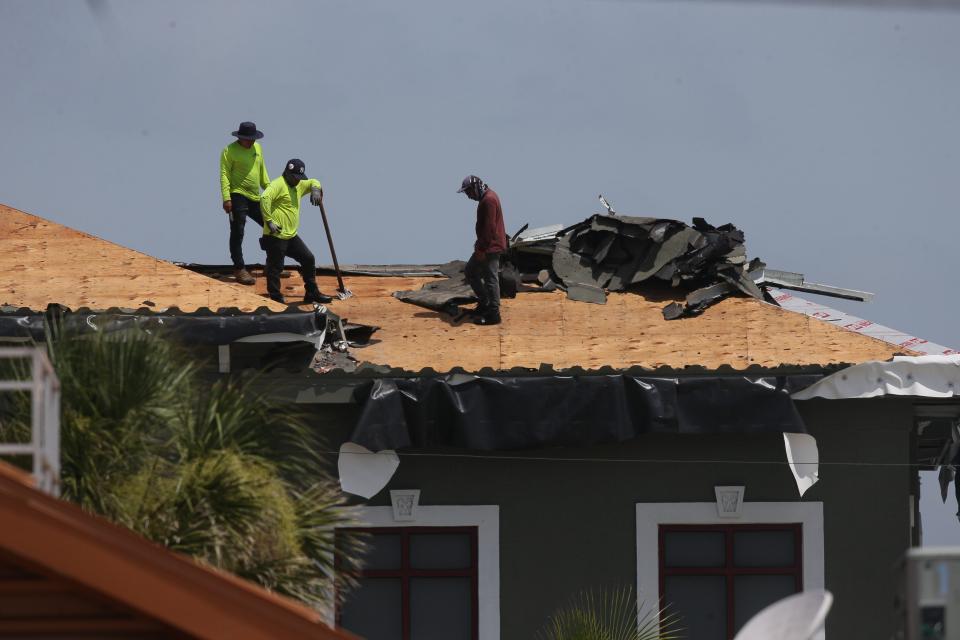Roofers and Florida's extreme heat: How hot is it up there?
Note to readers: Welcome to "Heat Week." This the second story in a seven-part series The News-Press and Naples Daily News are doing this week, taking a closer look at all things heat. Florida has been experiencing extreme and historic heat this summer, on land and in the water, and weather forecasters are predicting more intense temperatures as the summer continues.
Today's story focuses on one job (there are many others) that is not heat-proof. It is the job of the roofers, who nine months after Hurricane Ian continue to be dealing with a high volume of roofs that need to be replaced or repaired.
Rast Bryant is the general manager for Lloyd Roofing’s Southwest Florida division, which is based in Fort Myers. The company also serves Central Florida through an Orlando location and the Panhandle through its Tallahassee hub. To get a better idea of what roofers in Florida are going through, we asked him the following questions:
Florida's heat history: Weather history: These are Florida's 10 hottest days ever

How hot can it get on a Florida roof this time of year?
BRYANT: On the hottest, sunniest days, the surface of a roof can easily reach 125-140 degrees or more. When you see refraction of air – which looks like waves of vapor or steam – coming off the roof, you know it’s hot.
Does the extreme Florida heat this summer seem different than in year's past?
BRYANT: It’s brutal, for sure, but expected for July. In other parts of the country, heat waves might only last a few days or a week. In Florida, our heat wave lasts five to six months. We can still do roofing work when it’s hot, but you can’t roof when there is snow or ice outside, so there is certainly a tradeoff in our line of work.
Is tile, metal or shingle hotter?
BRYANT: Unpainted metal roofs generally feel the hottest to the touch, but tile and shingle roofs can be pretty close as far as temperatures. That’s why insulation is so important; it helps prevent the extreme heat from entering the interior of a home or business.
How do roofers protect their feet and hands when working on a hot roof?
BRYANT: Our company provides PPE (personal protective equipment) to roofing crews, including gloves. We also require our roofers to wear protective footwear or work boots, breathable pants and long-sleeved shirts to protect their skin from hot roof surfaces and UV rays from the sun.
What type of footwear do roofers wear?
BRYANT: Steel-toed boots with slip-resistant soles are the go-to shoe for our roofers. You shouldn’t be able to feel any heat when walking across the surface of a roof, and the steel toe helps prevent injuries if you drop any tools or supplies.
Have any of your roofers ever had the soles of their shoes melt?
BRYANT: No, and that’s because we stress the importance of good footwear and gloves during the orientation process. A good pair of work boots is an investment in your health and safety.
What is your policy for water breaks or periods of rest in the shade?
BRYANT: Our roofers are human beings, not machines. No one should work anywhere close to eight hours straight in these conditions. We provide employees with water, ice and coolers for their vehicles. Each employee undergoes training that covers ‘high heat’ working procedures and we encourage them to take frequent breaks to sit down in the shade and rehydrate. There is no limit on heat and water breaks; if they want one, they take one. Providing a safe working environment is a top priority.
Is there an on-site supervisor or project manager trained to spot signs of dehydration or fatigue?
BRYANT: All Lloyd Roofing employees and supervisors undergo training to prevent heat-related distress, and they can recognize and treat their coworkers who might be experiencing symptoms of heat exhaustion.

Is there a point at which it's too hot and you bring down roofers for their own safety?
BRYANT: Safety will always take precedence over profits. If the weather or conditions at a job site do not allow for a safe and successful roofing project, we will not allow our team to work. At the end of the day, we want each employee to return home safely to their families.
Do roofers work earlier shifts during the summer to avoid the Florida heat?
BRYANT: Roofers and construction workers generally start working shortly after sunrise and stop in the middle of the afternoon. That’s typical across Florida and much of the South. This schedule keeps you out of the heat during the hottest parts of the day while also allowing our crews to start wrapping up as afternoon thunderstorms start rolling in.
Are roofing contractors in Southwest Florida facing extra pressure to keep working in all conditions because there is still so much to do after Hurricane Ian?
BRYANT: Our roofing crews have been working tirelessly since the day after Hurricane Ian made landfall. To date, Lloyd Roofing has completed nearly 900 roof repairs and replacements in Southwest Florida, and we have many more on the schedule. What we won’t do, though, is compromise the safety of our roofers. If anyone feels fatigued or lightheaded, they know it’s OK to take a break. It’s similar to when thunderstorms approach; if there is lightning in the area, you get off the roof ASAP. Safety is not negotiable.
HEAT WEEK: Our special series
MONDAY'S STORY: How to save
How to save energy, money: We know. It's blistering hot. But don't blow your budget on your A/C. Here are some tips
This article originally appeared on Fort Myers News-Press: Florida extreme heat can be roofers worst nightmare

